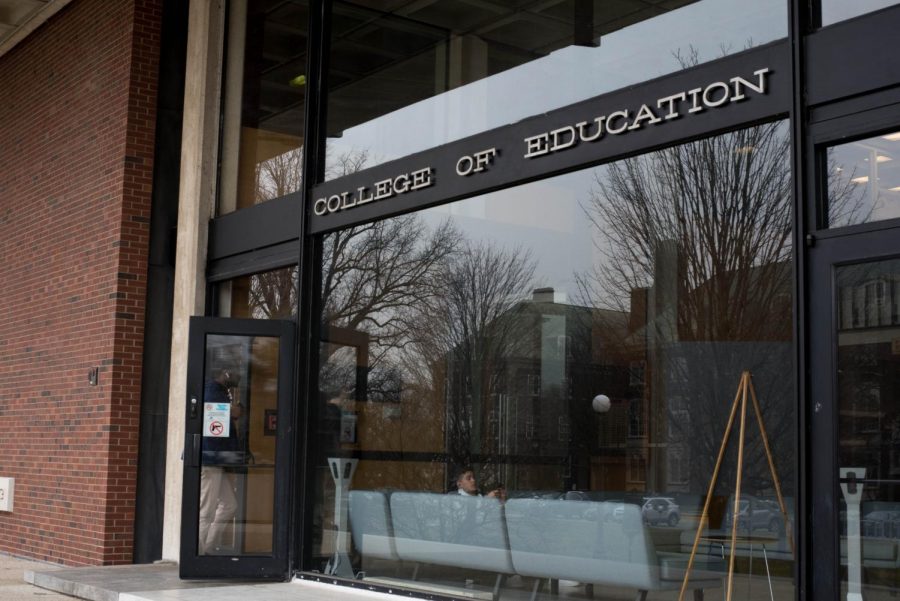Teacher shortage sparks licensing reevaluation
A student walks through the front entrance of the Education Building on April 1.
Apr 1, 2019
Last updated on Nov. 19, 2019 at 05:29 p.m.
As the state of Illinois experiences a continual decrease in the number of certified teachers, the Illinois Senate, along with other higher education leaders, have come together to analyze the licensing process.
In the most recent report done by the Illinois Board of Education, the school year of 2017-2018 saw a total of 1,407 teaching positions unfilled and a 3.4 percent decrease of teachers in the past decade.
Nancy Latham, executive director of the council on teacher education, said the University’s College of Education has also seen the same trend in recent enrollment.
“The teaching shortage in Illinois (is concentrated) in very specific content areas and geographic areas. There are critical shortages in math, science, special education, bilingual education and early childhood special education,” Latham said.
Get The Daily Illini in your inbox!
The state’s approach to this shortage is to reevaluate the lengthy and expensive licensing process including the three tests required for prospective teachers: the edTPA, TAP 400, SAT or ACT and the Illinois content test.
Latham said the TAP 400 is a basic skills test, which is more of a hindrance due to its level of difficulty. She said most students use the SAT or ACT as a replacement. However, Latham agrees with some legislatures that basic skills tests are not an efficient way of gauging a student’s basic skill set.
“If you are a degree seeker, you are required to take (general education classes) and if you get a certain grade in all those gen-eds, then you’ve proven that ability,” Latham said.
Raquel Caneva, sophomore in Education, agrees the basic skills tests are not the best measurements of a student’s ability.
“Some students are bad at test-taking and their test scores may not accurately reflect their educational abilities. There is also no way to directly tell how a student’s test-taking skills can accurately predict how well they will teach,” Caneva said.
The Illinois content test, which examines a student’s knowledge in the area they want to pursue, is facing criticism similar to the TAP 400. Latham said although some of the content tests have been redesigned, some are outdated.
“I have heard state board folks say they need to look at (the content tests) to decide if they are testing efficiently in terms of teacher content knowledge,” Latham said.
The third test and perhaps the most controversial is the edTPA. Latham defined the test as an assessment that involves a prospective teacher conducting a student evaluation at the end of their student teaching, creating lesson plans from this evaluation, videotaping the lessons and sending the video to an evaluator. This test costs $300.
Caneva believes the real problem with this test is the cost.
“Not only may these expensive tests discourage students from pursuing education, but they may actually prevent them from taking them again in order to succeed and become a teacher,” Caneva said.
Latham said the edTPA does well in evaluating a student’s actual teaching ability compared to the multiple choice test previously used. However, she believes the outside evaluation isn’t necessary. She said the University’s faculty along with the supervisors and the cooperating teachers in the classroom are the experts.
“They would be much better evaluators of that student’s ability to teach because they have to understand concepts of the classroom,” Latham said.
However, even if the licensing process were to be reformed, Latham believes there is another factor causing the shortage of teachers in Illinois.
“The profession has taken a hit in the public eye,” Latham said. “It really has become a place to blame and a place to lay fault. It’s constantly regulated, and teachers are held responsible for incredible test expectations of the students.”
She went on to say teachers have to picket and protest just to receive a decent wage and be above the poverty line.
Latham said in her perfect world, prospective teachers would go through a state-supported induction and mentoring program while getting their teaching licenses. Latham also added she would have teachers paid quadruple the amount they are currently paid.
“There’s no greater honor than being a teacher and there’s no greater profession,” Latham said.






